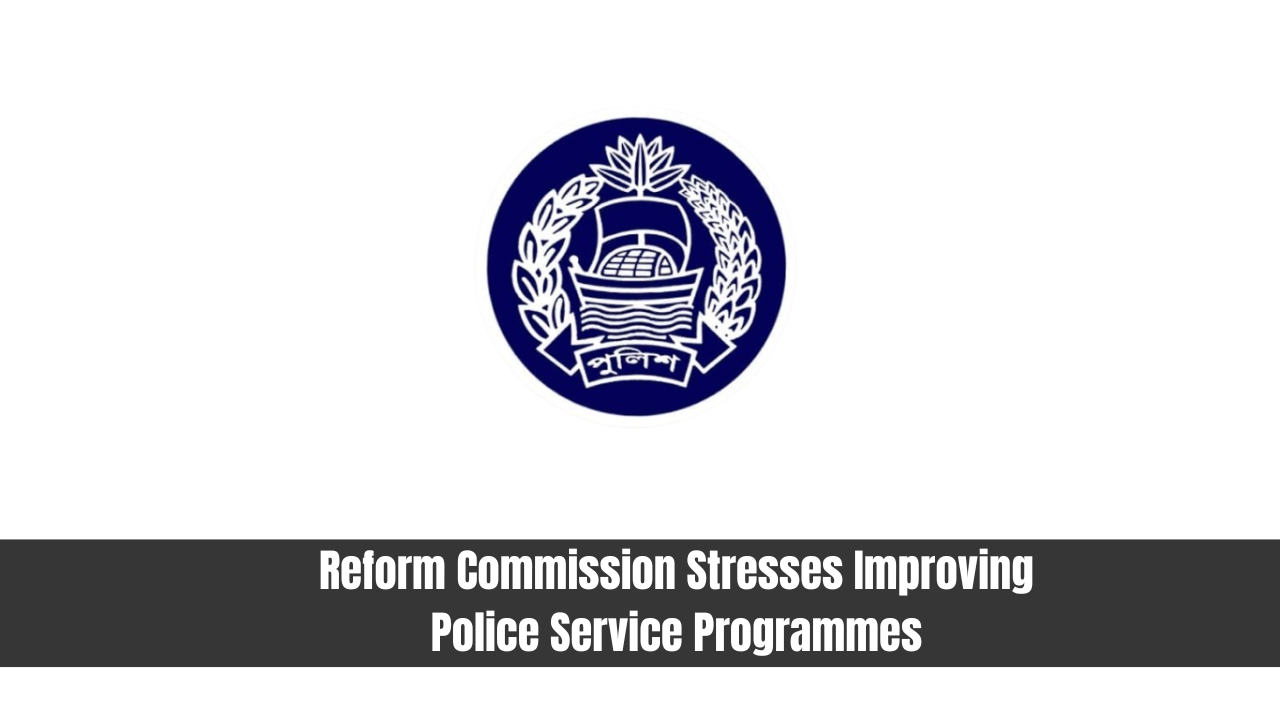Reform Commission Stresses Improving Police Service Programmes

Reform Commission Stresses Improving Police Service Programmes. The Police Reform Commission (PRC) in Bangladesh has recently underlined the need to improve service-oriented police programmes. These include initiatives such as Online General Diary (GD), Women’s Helplines on cybercrime, and Victim Support Centers. The commission believes that reforms, better awareness, and continuous monitoring are crucial to make these services more effective and public-friendly.
Read Also: Police Clearance
Why Police Service Programmes Need Urgent Reform
The PRC conducted a large-scale public survey called “Kemon Police Chai” (What kind of police we want). The findings were eye-opening. Most citizens expressed dissatisfaction with major service programmes. Only a few initiatives, such as the emergency hotline 999, received strong positive feedback.
Services like Online GD, Online Police Clearance, and Victim Support Centers were criticized for poor accessibility, lack of awareness, and weak follow-up. Citizens want a more transparent, responsive, and service-oriented police system.
Public Opinion in Numbers
The PRC’s survey included 24,442 respondents from across the country. Their feedback reflects the reality of current police services.
| Service Programme | Satisfied (%) | Dissatisfied (%) | Unaware (%) |
|---|---|---|---|
| Online GD Programme | 23.6% | 45.8% | 17.5% |
| Women’s Helpline (Cybercrime) | 24.1% | 35.5% | 38.1% |
| E-Trafficking Prosecution | 24.1% | 37.8% | 38.1% |
| Victim Support Center | 26.7% | 40.0%+ | Remaining |
| Emergency Call Service 999 | 56% satisfied | Few complaints | Widely used |
This table clearly shows that, except for 999, most services suffer from low satisfaction and low awareness.
Key Problem Areas Highlighted by PRC
1. Online GD Programme
The Online GD Programme was launched to make filing complaints easy and digital. But with only 23.6% satisfaction, people feel it is still complicated and often lacks follow-up from police. Many users complain that even after submitting an online GD, action is delayed or sometimes ignored.
2. Women Helpline for Cybercrime
In today’s digital era, cybercrime against women is rising. The Women’s Helpline was meant to be a lifeline for victims. However, 35.5% of respondents are dissatisfied, while nearly 40% didn’t even know about the programme. This gap shows that not enough awareness campaigns are being run.
3. Victim Support Centers
These centers were created to give immediate support to victims of crime. Unfortunately, with only 26.7% satisfaction, many feel the centers are underfunded, understaffed, and sometimes unhelpful. Victims often expect care and counseling but face bureaucratic hurdles instead.
4. E-Trafficking Prosecution
Human trafficking is a serious issue in Bangladesh. The PRC survey revealed that 38.1% of people were unaware of this programme, and 37.8% were dissatisfied with its performance. This highlights the urgent need for better officer training, resource allocation, and publicity.
Why Reforms Are Crucial
The PRC has made it clear: if Bangladesh wants a modern, people-friendly police service, certain reforms must be prioritized. These include:
- Better monitoring and accountability at all levels.
- Awareness campaigns using the Ministry of Information and mass media.
- Stronger online services so citizens feel safe and supported.
- More funding and staff training at Victim Support Centers.
- Transparency and efficiency in every service.
Reforms are not just about technology but also about attitude and trust. People want to feel that the police are working for them, not against them.
Positive Signs – The Case of 999
The emergency hotline 999 is the best example of success. With more than 56% of people satisfied, this programme shows that when a service is well-publicized, managed properly, and responds quickly, citizens respond with trust and appreciation.
The success of 999 proves that other services can also be improved with the right planning and management.
My Expert Opinion
As a finance and policy observer, I see clear connections between police reforms and economic growth.
- Investor Confidence: Foreign investors want stability. If the police service is reliable, risks of fraud, theft, and instability decrease.
- Social Development: Programmes like Victim Support Centers protect vulnerable groups, which strengthens community welfare.
- Digital Transformation: Services such as Online GD and Police Clearance support Bangladesh’s broader Digital Bangladesh vision.
When the public trusts its police services, the whole society benefits—socially, politically, and economically.
Conclusion
The Police Reform Commission’s findings are a wake-up call. Bangladesh must improve its police service programmes quickly. The survey shows that except for 999, most services like Online GD, Victim Support Centers, and Women’s Helplines have major gaps in performance and awareness.
For reforms to succeed, the government should focus on awareness campaigns, stronger monitoring, more funding, and staff training. If programmes are transparent, efficient, and citizen-friendly, public trust will grow.















